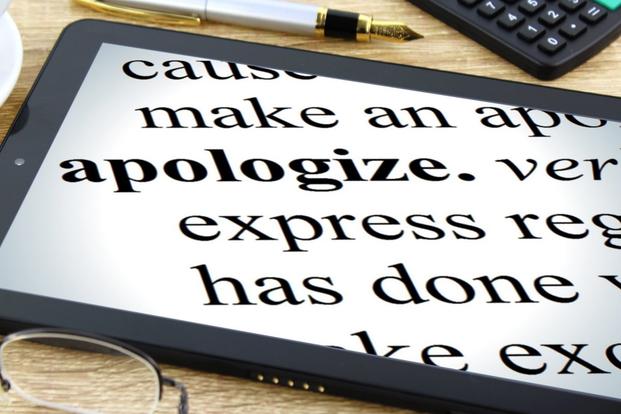Reading this headline, you might be wondering, "What does a military-to-civilian transition have to do with giving apologies?" There will be many times in your transition and job search when you will need to apologize to others, and giving an apology correctly is not something some people instinctively know how to do.
When Do You Need to Apologize?
Face it: Apologies are necessary virtually every day. Knowing how to apologize correctly will not only win you respect, but also help prevent troubling situations. Consider these scenarios:
- You arrive late for a job interview.
- You forget to follow up on a job lead.
- Someone sends you a lead, and you forget to thank them for the introduction.
- You accidentally share confidential information online.
- Your "joke" hurts someone's feelings.
- Your resume has typos in it.
- You attach the wrong cover letter when applying to a job.
- You refer to your previous employer in bad terms.
- On a social network, you tried to sell your contacts instead of build relationships.
- The hiring manager asks you not to call her "ma'am" ... and you don't stop.
- You storm out of a job fair because the employer asked you personal questions.
- You dressed too informally for a job interview.
Some of these scenarios might seem far-fetched. Others might ring true as examples of things you've already done in making the career transition.
Apologies seem easy for some people; they say, "I'm sorry," at the drop of a hat. For others, it's like pulling teeth to get them to admit their mistake or misstep, then own responsibility to make things right.
How to Say You're Sorry
Apologies have a certain structure, tone and timing to be meaningful. An effective apology includes these components:
- The apology must be specific and truthful. To offer a vague, "I'm sorry," doesn't assuage hurt feelings. Instead, specificity makes the most impact: "I'm sorry I forgot to include my resume when I sent my cover letter this morning. Please find it attached now."
- Similarly, an apology that isn't perceived to be sincere will fall on deaf ears. My son used to have an annoying way to apologize: He would roll his eyes back, sigh and say, "Sooooooory ..." As if he was more exasperated than apologetic. Be sure to look the person in the eye, apologize and, from their response, gauge how much more needs to be said.
- The apology shouldn't go overboard. An effective apology will sound like: "I'm sorry for being late. I anticipated traffic but not this much traffic. It won't happen again," and not, "I'm so, so, so sorry I am late. Oh, wow. Traffic in this city is terrible. Wow. I was driving on the sidewalk, and I'm still late." Keep the apology succinct to have meaning.
- An apology shouldn't be about winning. When you say you are sorry, you own accountability for what happened. If you shift blame or show how the other person is also at fault, you depreciate the value of the apology.
- Time your apology. If you mistakenly call the interviewer, "Sir," and it's a woman, apologize right away. Don't make a big deal out of it (hopefully it wasn't done in person), but own it, apologize and move on. Similarly, if you forget to follow up with a contact who sent you a lead, consider apologizing in a quick email and following up with a longer handwritten note that will reach them in a few days.
Some apologies will follow big, egregious mistakes and others will be for smaller missteps. Either way, the apology must be sincere, specific and immediate to have meaning. Simply apologizing to appease or out of obligation isn't enough.
Remember that employers, clients, vendors, colleagues and networking contacts have the opportunities you desire. To overlook accountability and responsibility for a mistake or misstep is to disregard the opportunities they offer (which you may lose out on).
Relationships matter a great deal in the civilian work world. How you handle the mistake can be more meaningful than the mistake itself.
Want to Know More About the Military?
Be sure to get the latest news about the U.S. military, as well as critical info about how to join and all the benefits of service. Subscribe to Military.com and receive customized updates delivered straight to your inbox.








